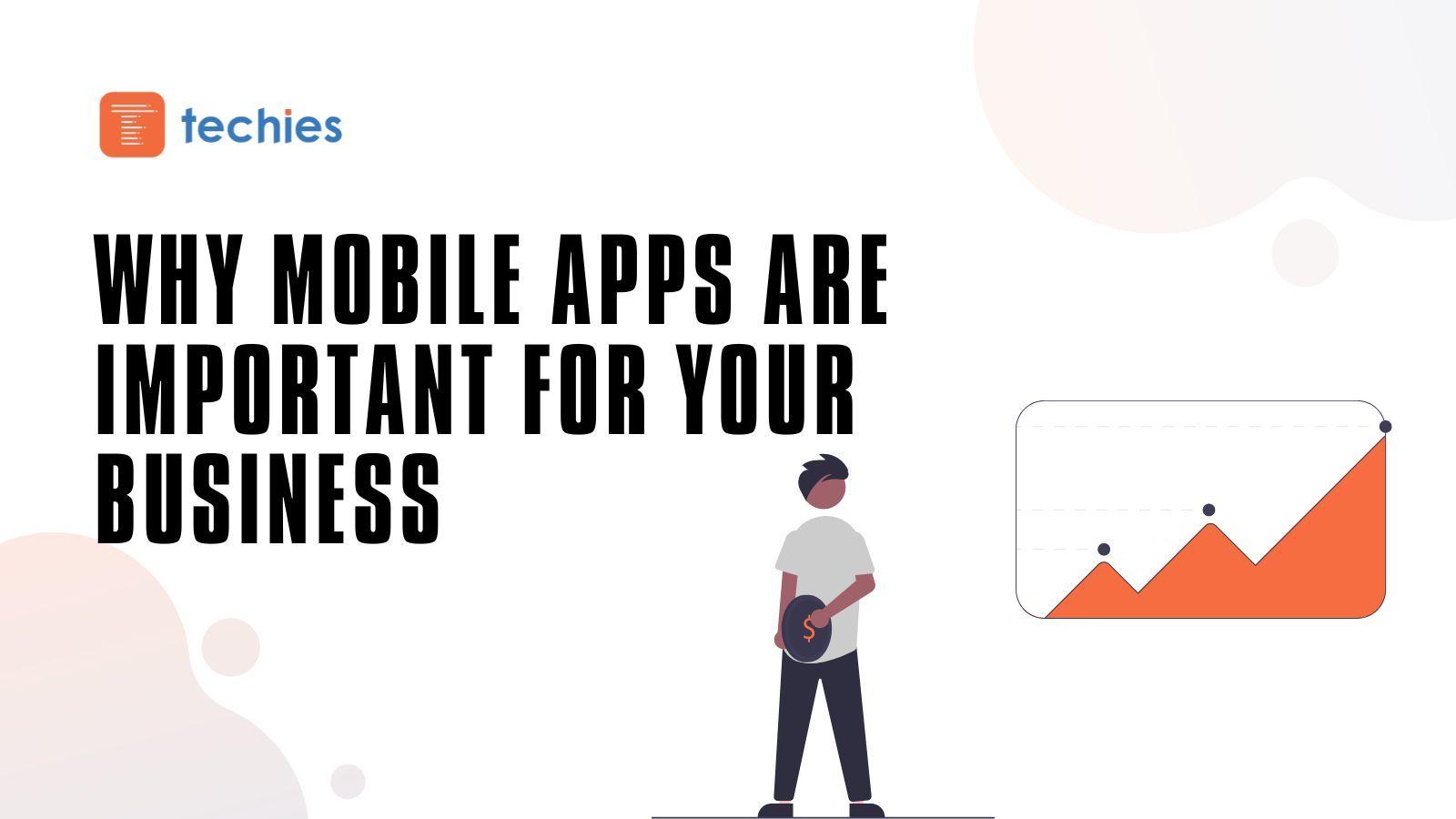The Business Booster: Why Mobile Apps Are Important for Your Business

Over the last decade, we have witnessed an extremely rapid advancement of mobile technologies. A testament to this is how accessible and affordable mobile phones have become to the average consumer.
The transition from 1G to 5G wireless mobile networks has further facilitated the transformation of mobile phones into smartphones. As such, more businesses are seeking ways to meet the dynamic and endless demands of modern consumers whose lives are entirely connected to these devices.
In practice, these ‘mini-computers’ have the power to serve as one’s personal assistant or even appointment manager.
And with such compacted computational power in the palm of human hands, it's only reasonable that businesses find ways to innovatively tap into this utility via diverse mobile apps related to different spheres of life.
This article aims to share why mobile apps might be a game-changer for many businesses.
Why is mobile app development important for business growth?
A growing number of businesses are seeking to go for mobile app development to enhance their business operations and drive sales activities.
There are several reasons for this seismic shift in thinking within the business landscape. For example:
Providing more value to your customers
Mobile apps provide a differentiated medium for businesses to provide more value to their customers. In order to facilitate customers’ purchase decisions, businesses can extend their mobile apps with e-Commerce features that enhance purchase convenience for customers.
In addition, e-commerce features give customers the ability to track their packages. This value add-on makes it clear to customers that a business wants them to feel at ease whenever making a purchase.
To provide more value add, some mobile apps can even be augmented with personalisation features that allow end users to select the content they desire in the app to make it more relevant to their needs.
Expanding your reach
According to Statista, smartphone mobile network subscriptions worldwide were approximately 6.4 billion in 2022, and are forecast to reach 7.7 billion by 2028. Furthermore, Data Reportal estimates that more than 67.1% of the world’s population currently utilises a mobile phone.
Generally, the paradigm shift from desktop to mobile browsing has been considerable in recent years. This is partly due to technological advancement, the rise of mobile-first designs and the fact that smartphones offer unmatched convenience and portability. This allows consumers to access the internet on the go.
This has consequently triggered an evident mobile-driven behavioural shift amongst consumers, which businesses can take advantage of.
Suffice it to say, the high level of mobile app acceptance among consumers globally reflects its compelling benefits for businesses seeking to expand their global reach.
For example, more retailers can survive the consequences of globalisation and open markets by creating mobile apps that provide personalised eCommerce services.
Enhancing customer engagement
Mobile applications can enhance customer engagement through personalised experiences and real-time engagement.
In practice, businesses can exploit mobile app features like push notifications for real-time engagement and create rewards and loyalty programs to create positive shopping behaviour.
Particularly, push notifications can keep a specific subset of customers continually engaged over time with information about product news and promotions. They can also be exploited to perform granular targeting with data like location and past engagement history.
Furthermore, mobile apps can help decongest shopping stores whilst offering multiple ways for customers to contact businesses directly. This is vital since not all customers utilise the same communication mediums. For instance, some may prefer phone calls, while others may prefer direct messages.
Increasing sales and revenue
According to the Pew Research Center, mobile devices are the top way to shop online in the USA— especially among young adults. Furthermore, Insider Intelligence predicts that by 2025, retail m-commerce sales will reach $728.28 billion, accounting for approximately 44% of retail e-commerce sales in the US.
These statistics clearly show an uptick in mobile shopping. This is compounded by trends such as the rise of social media and influencers promoting mobile apps to young adults. As well as, the popularity of payment apps and digital wallets, like Apple Pay, PayPal and Venmo, that offer a convenient and secure way to effect mobile payments.
As already alluded to, consumers now prefer convenience whilst accessing products or services from digital platforms.
Mobile apps offer such convenience through fully digitised seamless checkout processes, in-app purchases and upselling opportunities.
These mediums consequently directly translate into increased sales and revenue, which, in turn, results in profitability.
Building brand recognition
Brand recognition for any business is mission-critical when seeking to attract more prospects. A mobile application can provide a supplementary marketing channel to reach people who may not be familiar with one’s business.
For instance, if one has a native app in the Google Play store, people may find it whilst browsing related apps. Consequently, if the app looks appealing to them, they could decide to download it and become prospective customers.
Furthermore, small businesses can exploit push notifications to keep their brand in the front of customers' minds. This strong brand awareness can consequently help a business to drive digital traffic, outperform its competitors and increase revenue.
Gaining competitive advantage
In today's digital marketplace, competition is inherently fierce across industries and businesses need to innovatively stand out. One way to stand out is with a mobile application that offers unique customer-centric features, especially if your competitors don't maintain one.
Mobile apps offer a medium for convenient two-way communication between businesses and their customers. Convenient communication often leads to continued engagement, enabling businesses to monitor customer behaviours over time and adjust their sales strategies.
Additionally, mobile apps can be employed to enhance business transactions to be completed on time, leading to a positive customer shopping experience.
Furthermore, mobile apps can help cultivate customer loyalty as they create repeat business opportunities and improve referral and retention rates as well as service adoption rates.
Improving operational efficiency
Mobile apps are versatile platforms that transcend geographical limitations— enabling businesses to seamlessly operate across different continents.
Mobile apps can facilitate collaboration and communication between business teams, enabling them to coordinate tasks in real-time. Thereby, better streamlining their operations and augmenting their productivity.
Furthermore, mobile apps can be leveraged to derive analytics and actionable insights to inform strategic decisions.
In practice, businesses can collect data from across their different sales channels to understand customer preferences and sentiment.
In turn, this data can be extrapolated to identify operational inefficiencies, thus reducing operational costs and unlocking cross-selling/upselling opportunities to increase sales.
Enhancing customer support
Without positive customer relationships, a business will die. Customers are the bedrock of any business. Mobile applications can be employed to foster positive customer relationships by offering them access to 24/7 assistance through support features like in-app chat, messaging, or even AI-powered chatbots.
These communication mediums are tailored to provide immediate responses to customer queries, helping address their concerns in real-time. Thereby, better streamlining customer support processes, reducing response times, and ultimately fostering positive customer experiences.
Furthermore, these facilities provide a way to collect customer feedback in a manner that enables businesses to create comprehensive FAQ catalogues and knowledge bases.
Getting customer feedback
Mobile apps provide an interactive channel for users to share their opinions, suggestions, and testimonies. Companies can exploit in-app surveys and feedback forms that are strategically placed within a mobile app to capture real-time insights from users.
Additionally, some businesses can leverage contextual triggers, for example, after a completed transaction, to prompt users for feedback whilst their experience is fresh in their minds.
The feedback data collected can then be mined to enhance products, services, and overall customer satisfaction.
Future of business through mobile apps.
The future of business using mobile apps is boundless, powered by advancements of AI and the emergence of new technologies that focus on personalised and cross-platform experiences.
Let’s see some of these exciting speculative predictions, shall we?
Integration of advanced technologies (AI, AR, VR).
Artificial Intelligence (AI), Augmented Reality (AR), and Virtual Reality (VR) technologies are unlocking unparalleled value and opportunities across various sectors.
For example, AI automation promises to empower businesses to better streamline operations, enhancing operational efficiency and reducing human error.
Similarly, VR simulations are being employed for training and remote collaboration, fostering innovation in domains like digital health.
Relatedly, AR is being exploited to enhance shopping experiences by enabling customers to virtually ‘try-on’ clothing products, driving brand loyalty and repeat business.
The rise of app-only businesses
There may be a transformative shift in how businesses connect with consumers as many might opt to operate exclusively through dedicated mobile apps. Consequently, abandoning traditional website setups to create a more focused and immersive user experience.
App-only businesses may seek to capitalise on the growing dominance of smartphones. They may do this by creating more personalised interactions with customers, tailoring recommendations, and experiences based on user behaviour and preferences.
And as a result, it facilitates efficient transactions and interactions whilst fostering deeper connections, driving higher conversion rates, user retention and brand loyalty.
Continuous evolution of mobile app trends
As users’ behaviours and needs dynamically evolve, so will the mobile app trends.
In fact, as users increasingly demand more personalised experiences, businesses will need to remain flexible and forward-thinking to create apps that deliver value in new and exciting ways.
We expect more businesses to explore ways to create experiences that resonate with modern users.
For example, programmatically combining predictive recommendations, blockchain technologies and AR to overlay digital information onto the physical world.
Also read: Pros And Cons Of Mobile App Development For Your Business
Conclusion
In conclusion, mobile devices are an integral part of our daily lives as a substantial number of people rely on them for information, communication, and transactions.
As such, many businesses need to consider exploiting them to engage customers effectively and expand their reach.
Mobile apps facilitate seamless transactions and interactions, driving higher conversion rates in an increasingly competitive market.
Furthermore, having a mobile app can set any business apart, demonstrating a commitment to innovation and customer convenience.
Additionally, insights derived from mobile apps allow businesses to enhance their offerings, optimise user experience, and tailor marketing strategies based on real-time data.
Overall, mobile apps not only augment customer engagement, and foster brand recall and awareness, but also empower businesses with data-driven strategies that lead to growth.
Explore more about our web and mobile app development services at Techies. As a leading web and mobile app development company in Malaysia, we will be delighted to discuss how we can help you achieve your digital goals.
About Author
Kok Weng
Kok Weng Kong is a tech enthusiast and problem-solving expert with a passion for technology and innovation. As the Founder & CEO of Techies App Technologies Sdn. Bhd., he specializes in building beautiful web and mobile applications and providing branding and marketing solutions for businesses. With a background in Information Technology and extensive experience in the industry, Kok Weng Kong excels in creating innovative solutions for various tech challenges.

Digitizing businesses since 2017
© 2026 Techies | All rights reserved


